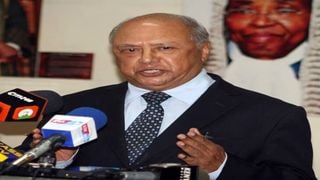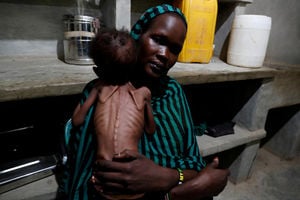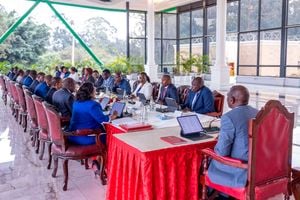
News
Premium
Sharad Rao: My dalliance with Charles Njonjo, Richard Leakey, and when judge wrote an order from ICU
This is not an obituary. I knew and worked closely with Charles Njonjo, and had met and interacted with Dr Leakey. A lot has been said and is known about Charles Njonjo and Dr Leakey. Hence, I will confine myself in this article to instances in regard to Charles and Dr Leakey that may be of interest to the wider public and what they may not be aware of.
When President Jomo Kenyatta died on August 22, 1978, a Goan doctor who was called to confirm whether he was dead was too scared to do so. Njonjo was in London at the time and Kenyatta’s death was kept secret until he was informed. Eventually, Kenyatta’s death was announced at 3pm the following day on the Voice of Kenya by veteran broadcasters Norbert Okare and Hassan Mazoa in English and Kiswahili respectively.
Meanwhile, the government’s top machinery led by Head of the Public Service Geoffrey Kariithi had been working with Njonjo for a smooth transition of power to Vice President Daniel arap Moi. The announcement was made as Moi was sworn in as acting President by then Chief Justice Sir James Wicks. Three months later, Moi was confirmed as President. This was due largely to the efforts of Njonjo—the powerful Attorney General at the time.

Former Attorney General Charles Njonjo addresses old students and parents of Njonjo Girls High School in Laikipia County during 30th anniversary celebrations.
Njonjo was not popular with fellow Kikuyus nor among other Africans who felt that he was too British oriented and unduly favoured Europeans. He resisted attempts by fellow Kikuyus to install a Kikuyu President. It was Njonjo who had convinced Kenyatta to stop the change-the-constitution group that wanted to bar Moi from automatically succeeding Kenyatta. Once installed, Moi, whom many thought would be a passing cloud, settled down and had Njonjo as his right-hand man.
Indian astrologer
After George Bush, then the US vice President, visited Kenya, there were rumours that he had mooted the possibility of the appointment of Njonjo as vice President. This alarmed Moi’s confidantes, who saw it as a US move to bring in Njonjo as vice President and, at a later date, make him President.
About the same time, a controversial Indian astrologer, Chandra Swami, visited Kenya and managed to call on Moi, whom he was able to impress with his tantric and astrological skills. Chandra Swami had risen to fame as a result of his association with former Indian Prime Minister Narsimha Rao.
He had also met Margaret Thatcher and had correctly predicted that she would become the Prime Minister of Great Britain. When on an official visit to India, Mr Natwar Singh, who was at the time the Deputy High Commissioner of India and had arranged the meeting, reminded her of that visit. She responded nervously: “We shouldn’t talk about these matters.” In 1996, Chandra Swami was convicted in India of massive financial irregularities. It is believed that, during one of his several calls on Moi, he identified a number of Moi’s close associates as his enemies and named Charles Njonjo among them after failing to extract a financial consideration from Njonjo for not citing him as such.
After the attempted coup on August 1, 1982 masterminded by Senior Private Hezekiah Ochuka, Njonjo was accused of plotting against Moi and a tribunal was set up headed by Justice Cecil Miller, with Justices Chuni Madan and Lady Effie Owuor as members. The tribunal found Njonjo guilty of plotting against Moi. I had also been called to give evidence before the tribunal as I was DPP at the time and had prosecuted Andrew Muthemba—who was charged with treason. It was my considered view then, and still is, that the evidence before the tribunal did not support the finding. Njonjo was later “graciously” pardoned by Moi for an offence which I say he did not commit. I have explained my reasons for saying so in a book that I am writing about my experiences in the Government and outside it. Dr Leakey was Njonjo’s close friend and coincidentally died a few hours after Njonjo’s demise. I also knew him and was associated with him in two instances.
Prostatic legs
The first was when I had resumed private practice after my return from Holland in 1996. Dr Leakey was chief secretary at the time. One morning, he rang me. He said he wanted to come over to meet me and that it was urgent. The lifts were that day out of service and my office was on the 21st floor. I told Dr Leakey that I would come down to meet him. He said, ‘No’, he would walk up. With prostatic legs, he walked up the twenty one floors. When I asked him what was so urgent, he told me he wanted me to join his dream time and return as DPP.
I asked him whether he had discussed that with the President. He said he had and also with the World Bank, which was going to finance his dream team. He said that, if I agreed, the President wanted to make the announcement the same day. I agreed but told him that I wanted him to know that I had a medical appointment in Delhi the following week. He said it would not look right for me to be appointed the DPP and to travel to India the following week for medical reasons. We agreed that we would postpone the announcement until after my return.

Dr Richard Leakey at a press conference on March 19, 2014.
On my hurried return from India, I rang Dr Leakey to tell him that I was back. He said that the news of my possible appointment as DPP had leaked and the President had changed his mind citing as reason that he could not have a European as chief secretary and an Indian as DPP and both allied to Charles Njonjo. So, I continued in private practice.
After that, I came to act for Dr Leakey in a court case. It all started when Philip Murgor, who had served as DPP at one time, had in private practice filed a private prosecution against William Lemstra,the general manager of ABN Bank in Kenya. He had also included some senior executives of the bank resident in the Netherlands.
This arose from a civil suit that he had filed against the bank on behalf of a Dutch national, John Nottingham, Joyce Nottingham and their firm Rosafric. Rosafric were in the horticulture sector and had taken a loan from ABN Bank and were unable to repay. Dr Leakey was a close friend of the Dutch royal family and wrote to Amos Wako, the then Attorney General, to look into the case. Wako filed a nolle prosequi and had the case dismissed. When Dr Leakey resigned as chief secretary, Mr Murgor brought a private prosecution against him on a charge of conspiracy to defeat the course of justice. Dr Leakey requested me to act for him. He had been granted bail but was forced to deposit his passport with the police.
Series of lectures
Just before Christmas, when the courts were on vacation, Dr Leakey was invited to the US to give a series of lectures. He needed to have his passport released to enable him to travel. I went to court and met the duty judge, Justice V V Patel. I told him that I wanted to apply for the release of Dr Leakey’s passport and why. He asked me to file a formal application and have it served on the DPP. I told him that if I did that, the DPP would ask for time and Dr Leakey would not be able to leave for the US in time. The judge told me to bring a formal application the following morning and he would deal with it ex parte and order the release of the passport. I did as I was told.
When I went to the court the following morning, I found Justice Patel’s chamber locked. On inquiring, the guard said he had seen the judge arrive and his car was in the parking bay. At the same time, I saw Chief Justice Gicheru going to his chambers. I told him that the judge had asked me to appear before him but his office was locked. He had the office forced open and we found the judge on the floor. He called an ambulance and the judge was taken to M P Shah hospital. He had had a heart attack.
A day later, I received a call from the hospital. They told me that the judge wanted to see me. I complied. The judge was in ICU. He lifted the mask and said he was sorry for not having been able to deal with my application the day before as he had promised to do. He asked me to get a pen and paper and said he would make the order from his bed. I told him that was not necessary and, in any case, it was not wise to do so as they would accuse him of having been bribed to do so. He said: “Have I asked you for anything and have you offered or given me anything? Then, why are you afraid?”
He proceeded to write and gave me the order for the release of Dr Leakey’s passport. He died that night. This was a unique gesture and typical of Justice V V Patel, known and respected for his honesty and integrity. Dr Leakey was able to fulfil his assignment and, upon his return, the case against him was discontinued. I last met Dr Leakey at Charles Njonjo’s 100th birthday celebration at Muthaiga Country Club. Also invited was Sudhir Raithata who told me that Njonjo had asked him to arrange his cremation upon his death and had so directed in his will.
The above accounts are referred to in my book—hopefully to be published soon, under the title “Jomo to Uhuru—Rao’s nine lives”. This was the heading of an article in the Nation and John Kamau, the author of that article, kindly agreed to allow me to use it as a title for my book.
Sharad Rao was Kenya’s deputy public prosecutor.




